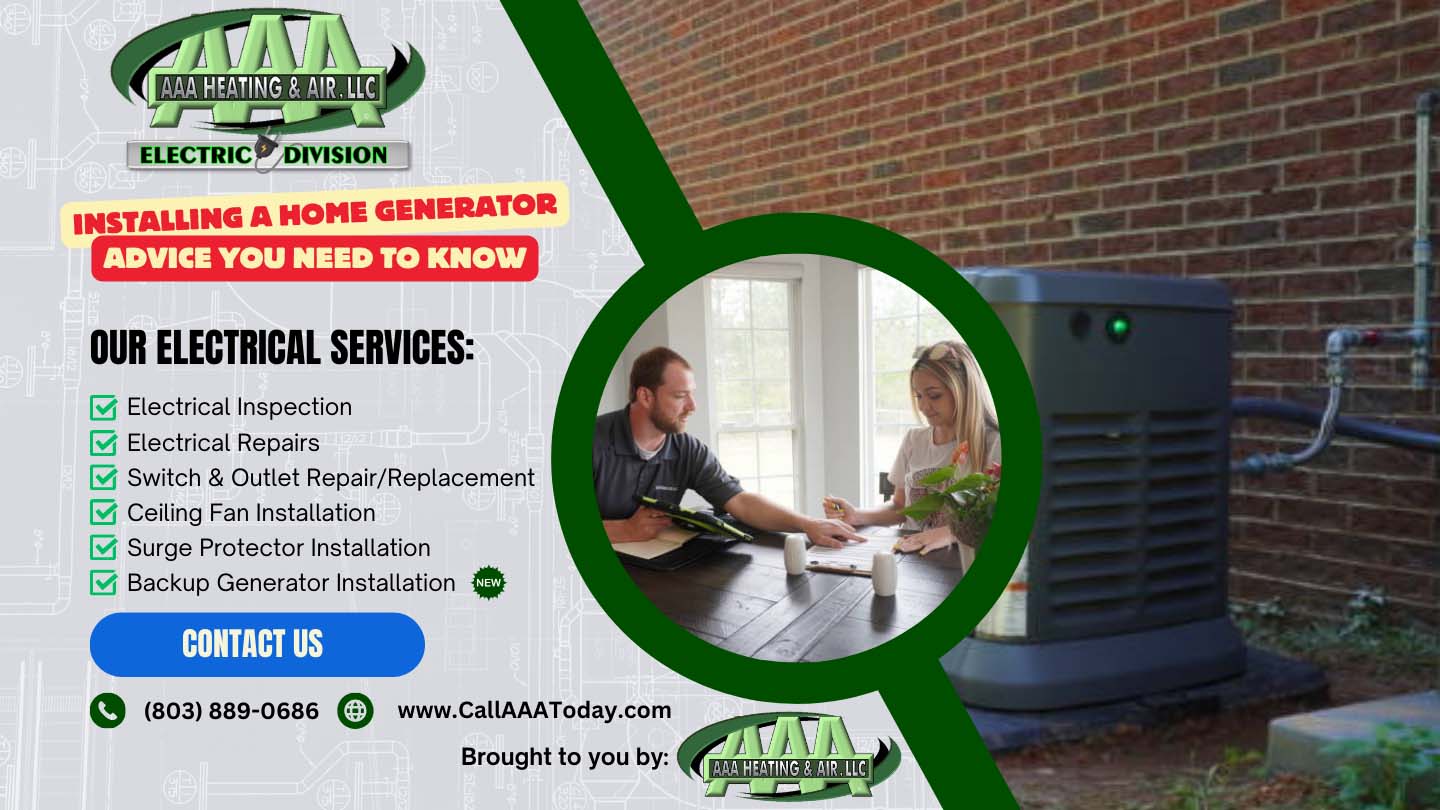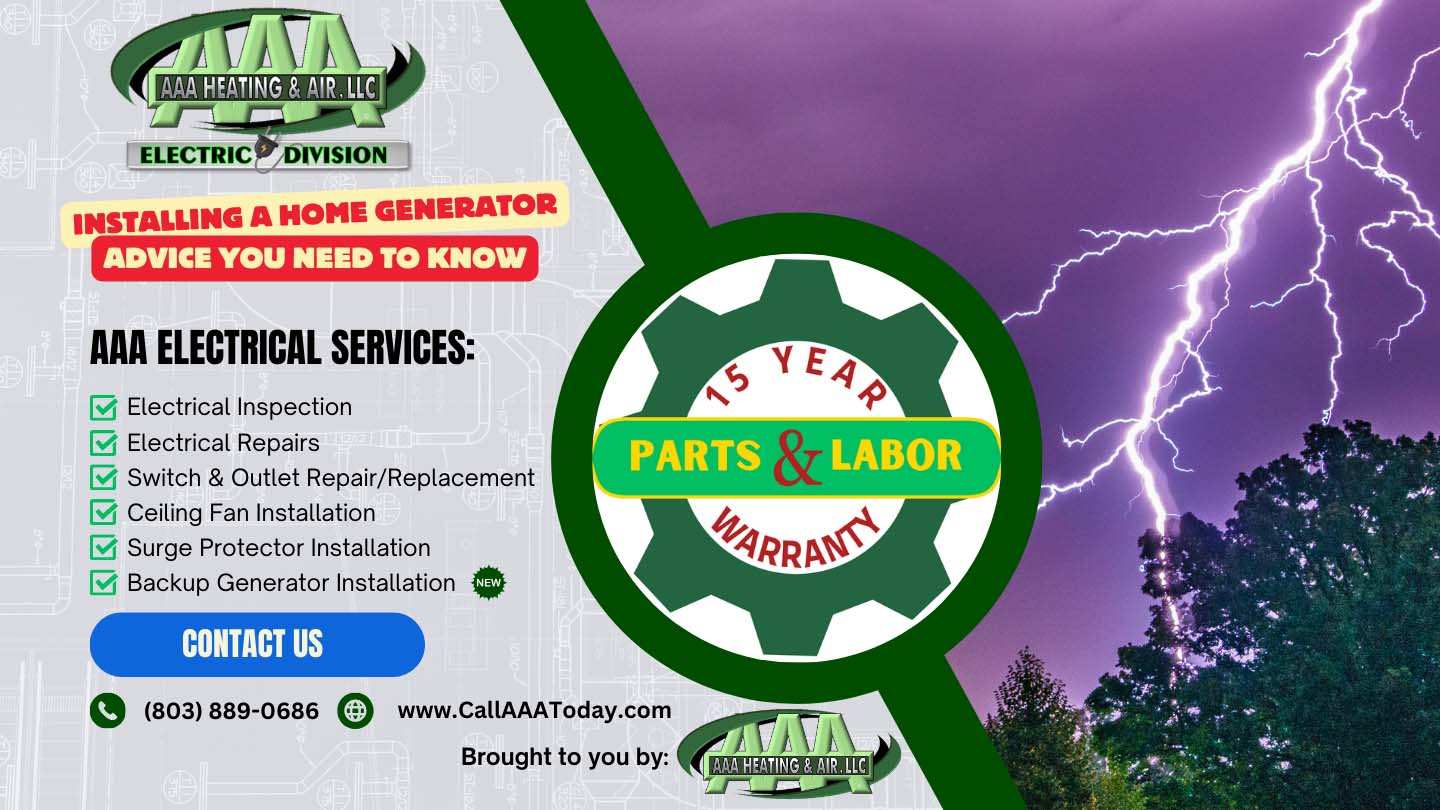Living in the Midlands of South Carolina, we know that power outages can strike at any moment—whether it’s a summer thunderstorm rolling through Lexington, a winter ice storm in Columbia, or the occasional hurricane brushing up from the coast. For homeowners, these disruptions aren’t just inconvenient; they can threaten your comfort, safety, and even your wallet. That’s where a home generator comes in—a reliable solution to keep your lights on, your food fresh, and your family secure. But before you jump into installing one, here’s some Home Generator Advice you need to know to make the right decision.
Why a Home Generator Matters in the Midlands
Let’s face it: South Carolina’s weather can be unpredictable. From the muggy heat of August to the rare but disruptive ice storms in January, power grids in Richland, Lexington, and Kershaw Counties often take a beating. When the power goes out, you’re left without air conditioning, refrigeration, or even the ability to charge your phone. For families with young kids, elderly loved ones, or medical equipment, that’s more than an annoyance—it’s a risk. A home generator ensures you’re never left in the dark, no matter what Mother Nature throws your way.
Home Generator Advice: Choosing the Right Generator for Your Home
Not all generators are created equal, and picking the right one depends on your needs. Here’s what to consider:
-
- Size and Power Output: Think about what you want to keep running. A small portable generator might power a fridge and a few lights, but if you want to run your HVAC, well pump, or the whole house, you’ll need a standby generator with higher wattage. Most Midlands homes do well with a 10-20kW standby unit—enough to cover essentials and then some. Try out our Generator Sizing Calculator
-
- Fuel Type: Generators typically run on propane, natural gas, or diesel. Propane is widely available in rural areas like Saluda County, while natural gas is a convenient option if you’re hooked up in Irmo or Chapin. Diesel works too, but storage and maintenance can be trickier.
-
- Portable vs. Standby: Portable generators are cheaper and great for occasional use, but they require manual setup and refueling. Standby generators, permanently installed outside your home, kick on automatically when the power fails—perfect for peace of mind during those Midlands storm seasons.
Installation: Don’t Skip the Pros
You might be tempted to DIY, but installing a home generator isn’t like hanging a ceiling fan. It involves electrical work, fuel lines, and local permits—things best left to licensed professionals. In South Carolina, improper installation can void warranties, violate building codes, or worse, create safety hazards like carbon monoxide poisoning. A certified installer will handle everything: sizing the unit, securing permits from Midlands municipalities, and ensuring proper ventilation and grounding. Trust us, this is one job worth doing right the first time.
Home Generator Advice for Longevity
Once your generator is installed, it’s not a “set it and forget it” deal. Regular maintenance keeps it ready for action:
-
- Run It Monthly: Let it operate for 10-15 minutes to keep the engine lubricated.
-
- Check Fuel Levels: Stale fuel can clog the system, so refresh it every 6-12 months if unused.
-
- Schedule Annual Tune-Ups: A pro can spot issues before they become emergencies.
Cost vs. Value: What To Expect
Yes, generators come with an upfront cost—portables start around $500, while standby models can range from $5,000 to $10,000 installed. But think of it as an investment. A reliable generator protects your home from spoiled food, burst pipes in winter, or costly hotel stays during extended outages. Plus, in the Midlands real estate market, a standby generator can boost your home’s resale value—buyers here know the perk of outage protection.
Be Ready for the Next Storm with our Home Generator Advice
Here in the Midlands, we’ve all seen the grocery stores empty out and gas stations line up when a big storm’s on the radar. Don’t wait until the last minute to think about a generator. Power outages don’t send RSVP’s—they just show up. With AAA Heating & Air, Electrical Division’s Home Generator Advice, you’re not just reacting; you’re prepared.
Take the Next Step
Ready to take control of your power? Don’t let another outage catch you off guard. Prepare for power outages! Call AAA Heating & Air’s Electrical Division at (803) 889-0686 or click HERE to schedule an appointment online, 24/7. Our local experts are standing by to help Midlands homeowners like you find the perfect solution. Stay safe, stay powered, and enjoy the peace of mind you deserve.

Written by: Jared M. Sewell

